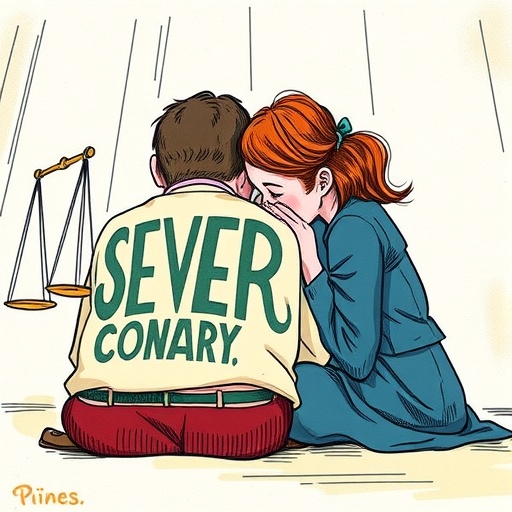The legal system is increasingly criticized for its inability to adequately address the profound and enduring financial ramifications experienced by victims and survivors of domestic abuse. A pivotal new study from the University of Exeter, led by Dr. Ellen Gordon-Bouvier, highlights urgent systemic shortcomings and advocates for reform that prioritizes the economic consequences of abuse in family law, especially during the division of financial assets following divorce. The research exposes how current practices marginalize survivors and inadvertently perpetuate abuse by neglecting the full scope of its financial impact.
Contemporary family law often restricts consideration of domestic abuse to extreme or atypical cases, failing to acknowledge its pervasive influence on marital financial arrangements. This limited approach overlooks the multidimensional detriment—spanning economic deprivation, psychological trauma, and physical harm—that survivors endure. Dr. Gordon-Bouvier’s study argues for an expanded framework wherein the law explicitly recognizes and mitigates these harms during asset division, enabling courts to enhance financial awards in a manner responsive to abuse dynamics.
The significance of material resources in fostering victim-survivors’ recovery is a central theme. Access to adequate financial means can facilitate independence, psychological healing, and a tangible break from the cycle of abuse. Yet, under the existing legal doctrine, courts are often reluctant to incorporate the presence of domestic abuse as a determinative factor unless it meets narrowly defined thresholds, effectively turning a blind eye to the pervasive damages suffered. This legal inertia creates a gap that allows perpetrators to maintain economic control and influence even post-separation.
One of the study’s critical insights is the inadequacy of assessing detriment solely through an economic lens. Psychological and physical impacts of abuse, while less quantifiable, play crucial roles in a survivor’s long-term wellbeing and ability to rebuild. Dr. Gordon-Bouvier emphasizes that courts must adopt a more holistic evaluative approach, incorporating these factors alongside traditional financial considerations to achieve equity in asset distribution. Such a shift would require judicial recognition of abuse as an inherently multifaceted phenomenon.
The legal foundation for current practice lies within section 25(2)(g) of the Matrimonial Causes Act 1973, which permits courts to consider conduct “only where it would in the opinion of the court be inequitable to disregard it.” However, judicial interpretation has generally been restrictive, often excluding many forms of abuse from influencing financial settlements. This constricted scope systematically disadvantages victim-survivors by ignoring the economic abuse commonly entwined with physical and psychological maltreatment, thereby perpetuating financial injustice.
Dr. Gordon-Bouvier contends that recognizing the increased resource needs of survivors does not equate to penalizing perpetrators but reflects a just acknowledgment of the imbalance created within the marital relationship. Economic abuse—manifested through deprivation, control over finances, or inequitable sharing of assets—means perpetrators frequently obtain a direct material benefit from abusive behavior. Adjusting financial awards to reflect this reality rectifies inequalities rather than imposing punitive damages.
The call for reform extends into procedural recommendations. The study identifies that reliance on court orders mandating periodic payments or installment-based lump sums can leave survivors vulnerable to defaulting by perpetrators, potentially triggering further financial instability or abuse. Instead, the research advocates for “clean break” settlements, which finalize asset division decisively and provide survivors with immediate and unambiguous security, reducing ongoing dependence on the perpetrator.
This research underscores the necessity for the family justice system to adopt a more forward-thinking, survivor-centered model, one that can effectively mediate the intersection between domestic abuse and financial law. Recognizing abuse in asset division is a transformative step, positioning the law as not merely a mechanism for contract termination but as an instrument of restorative justice, enabling survivors to reconstruct their lives with dignity and autonomy.
In broadening the legal framework, policymakers and practitioners must confront the challenges inherent in quantifying non-economic harms and integrating them into rigid financial calculations. This demands interdisciplinary collaboration, drawing from psychological, sociological, and economic expertise to create assessment models that capture the complex realities of abuse. Such innovation is vital to ensuring equitable outcomes and dismantling systemic biases that currently afflict the family justice system.
The wider implications of this reform extend beyond individual cases, as they touch on deeply embedded societal values regarding fairness, gender bias, and social welfare. Domestic abuse disproportionately impacts women and children, making equitable financial consideration a critical intersection of gender studies and social policy. By embedding survivor needs at the heart of asset division, the law can also signal broader cultural shifts towards recognizing and rectifying gendered power imbalances within intimate relationships.
Dr. Gordon-Bouvier’s study is a clarion call to reimagine how justice is delivered post-divorce for survivors of domestic abuse. It acknowledges the inherent complexity of legal reform yet asserts that legislative and judicial systems must evolve to meet the lived realities of survivors. The family justice system’s credibility and effectiveness hinge on its ability to respond holistically and empathetically to domestic abuse, ensuring that legal remedies are not just procedural formalities but meaningful mechanisms of recovery and empowerment.
Ultimately, integrating the consideration of domestic abuse into financial remedies symbolizes a critical juncture where law, social science, and human rights converge. It challenges entrenched legal norms and champions a paradigm shift grounded in fairness, respect, and responsiveness. As calls for reform gather momentum, this research lays a robust evidential foundation for transforming family law in a way that truly serves and safeguards victim-survivors.
Subject of Research: People
Article Title: Domestic abuse and financial remedies—making the case for a new approach
News Publication Date: 14-Oct-2025
Web References: http://dx.doi.org/10.1093/lawfam/ebaf032
Keywords: Social research, Sociology, Society, Gender studies, Social values, Fairness, Gender bias, Social welfare, Child welfare




